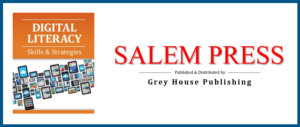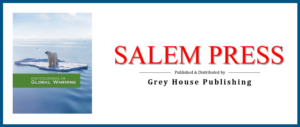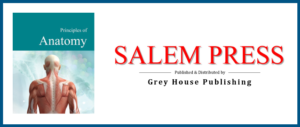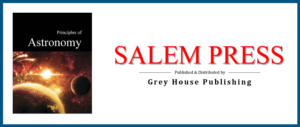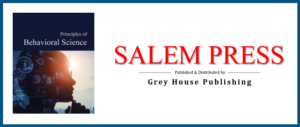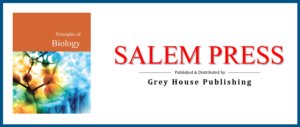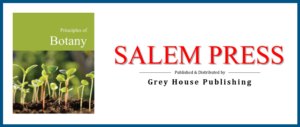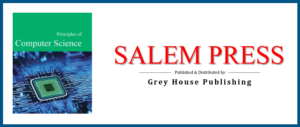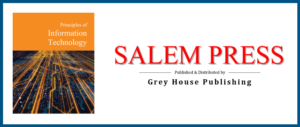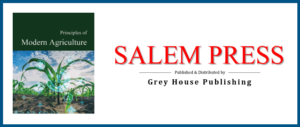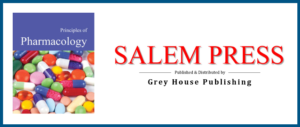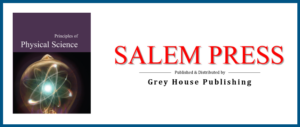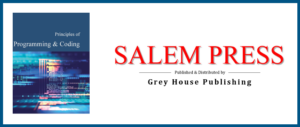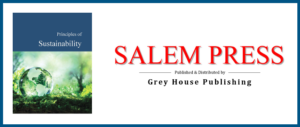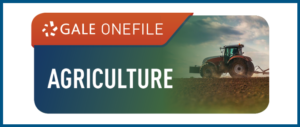 Agriculture provides access to journals covering agriculture and its related fields. Researchers can access current and authoritative periodical content that spans the industry—from practical aspects of farming to cutting-edge scientific research in horticulture
Agriculture provides access to journals covering agriculture and its related fields. Researchers can access current and authoritative periodical content that spans the industry—from practical aspects of farming to cutting-edge scientific research in horticulture
Digital Literacy: Skills & Strategies (Salem Press)
Salem Press is pleased to announce our Digital Literacy: Skills & Strategies volume, a carefully curated selection of essays aimed at increasing awareness and understanding of the changing digital landscape in education and in society at large. Digital technology is creating a progressively borderless world, one in which ideas and information can be shared in a decentralized manner. Along with this democratization, however, has come misinformation (unwitting or deliberate), data privacy issues, and all manner of cybercrime. Digital literacy—broadly defined as understanding and being able to use digital devices and technologies such as internet platforms and social media—has become an essential component to living, working, and taking part in education in modern society. Critical thinking skills and science and data literacy are paramount to maneuvering the digital information environment with confidence.
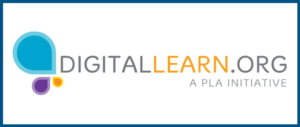 Designed to help promote digital literacy. If you are new to computers, haven’t used them for a while, are a little unsure and uncomfortable, or just need a bit of a refresher, this resource has the tools to help you tackle technology at your own pace and gain the confidence you need to succeed.
Designed to help promote digital literacy. If you are new to computers, haven’t used them for a while, are a little unsure and uncomfortable, or just need a bit of a refresher, this resource has the tools to help you tackle technology at your own pace and gain the confidence you need to succeed.
Encyclopedia of Global Warming (Salem Press)
Principles of Anatomy (Salem Press)
This new resource introduces students and researchers to the fundamentals of anatomy using easy-to-understand language that provides both a solid background and a deeper understanding and appreciation of this important and evolving subject. The book contains 172 entries which are arranged alphabetically, from “Abdomen” to “Wounds,” making it easy to find the topic of interest.
Principles of Astronomy (Salem Press)
This new resource introduces students and researchers to the fundamentals of astronomy using easy-to-understand language, giving readers a solid start and deeper understanding and appreciation of this complex subject. The 140 entries range from Ablation to Quarks to XMM-Newton, and are arranged A to Z, making it easy to find the topic of interest.
Principles of Behavioral Science (Salem Press)
Following the Editor’s Introduction, Principles of Behavioral Science includes 171 entries. Each starts with a brief definition that summarizes the topic, and subject entries include a bulleted list of key concepts. Many entries include photographs and diagrams, and all entries end with a helpful bibliography. The introduction begins with discussion of the earliest mention of depression and thought disorders, in 1550 BCE in the Eber’s Papyrus, and touches on other pre-modern-era explorations of mind, mental health, and behavior before delineating how scientific investigation changed the study of psychology. Following the entries, Principles of Behavioral Science ends with helpful appendices: Bibliography; Glossary; Organizations; and Subject Index.
Principles of Biology (Salem Press)
This new resource introduces students and researchers to the fundamentals of physical science using easy-to-understand language, giving readers a solid start and deeper understanding and appreciation of this complex subject. The 112 entries range from Activation Energy to Zoology and are arranged in an A to Z order, making it easy to find the topic of interest.
Principles of Botany (Salem Press)
This resource introduces students and researchers to the fundamentals of botany using easy-to-understand language that provides both a solid background and a deeper understanding and appreciation of this important and evolving subject. The book contains 145 entries which are arranged alphabetically, from “Adaptive Radiation” to “Wood,” making it easy to find the topic of interest.
Principles of Computer Science (Salem Press)
Computer science generally refers to the body of knowledge that allows humans to use mechanical aids to do mathematical calculations very efficiently. While the term computer originally referred to a human who was able to do simple arithmetic quickly and accurately, the name has been transferred to programmable automata, which are able to do the same thousands to billions of times faster. Clearly computer science is in the midst of a revolution of its own making. It is not possible to predict where or when things will “settle down,” or if they ever actually will. Nonetheless, a few outcomes are already clear: Information will become more and more available and there will be an increased need for professionals in the great many fields impacted by the advances described here. If this volume helps you to see even a bit more clearly through the maze of opportunity, it has been well worth the effort of the publisher to bring it together.
Principles of Information Technology (Salem Press)
This new resource introduces students and researchers to the fundamentals of information technology using easy-to-understand language that provides both a solid background and a deeper understanding and appreciation of this important and evolving subject. The book contains 121 entries which are arranged alphabetically, from “Access to Communications Technology” to “Workplace Monitoring,” making it easy to find the topic of interest.
Principles of Modern Agriculture (Salem Press)
This resource introduces students and researchers to the fundamentals of modern agriculture using easy-to-understand language for a solid background and a deeper understanding and appreciation of this important and evolving subject. All of the entries are arranged in an A to Z order, making it easy to find the topic of interest. This reference work begins with a comprehensive introduction to climatology, written by volume editor Richard Renneboog, MSc.
Principles of Pharmacology (Salem Press)
This resource introduces students and researchers to the fundamentals of pharmacology using easy-to-understand language for a solid background and a deeper understanding and appreciation of this important and evolving subject. All of the entries are arranged in an A to Z order, making it easy to find the topic of interest.
Principles of Physical Science (Salem Press)
This resource introduces students and researchers to the fundamentals of physical science using easy-to-understand language, giving readers a solid start and deeper understanding and appreciation of this complex subject. The 112 entries range from Audiology to Weight and Mass Measurement and are arranged in an A to Z order, making it easy to find the topic of interest.
Principles of Programming & Coding (Salem Press)
This book presents over 140 articles on various aspects of coding and programming. The articles range from the strictly technical to general discussions of human psychology. Not all are free from controversy. Nor will reading of all the articles make one an expert on any branch of computer science. Nonetheless, the articles provide a snapshot of the current state of this rapidly changing field of human endeavor, one so rapidly changing that a bright high school student’s contribution may have more impact than that of a Ph.D. Indeed, many of the most successful workers in this area have interrupted their formal education so that they could devote all their youthful energy to it. The only promise that can be made to the reader is that changes are taking place and that the pace of innovation is not slowing down.
Principles of Sustainability (Salem Press)
Salem Press is pleased to add Principles of Sustainability as the ninth title in the Principles of series that includes Chemistry, Physics, Astronomy, Computer Science, Physical Science, Biology, and Scientific Research. This new resource introduces students and researchers to the fundamentals of Sustainability using easy-to-understand language, giving readers a solid start and deeper understanding and appreciation of this complex subject. The 149 entries include entries that explain basic principles of Sustainability, ranging from Agricultural Runoff to Zoning Laws, as well as discussions of important treaties, laws, organizations, and events related to sustainability, such as Convention on International Trade in Endangered Species (CITES), United Nations Environment Programme (UNEP), and Earth Day. All of the entries, and are arranged in an A to Z order, making it easy to find the topic of interest.
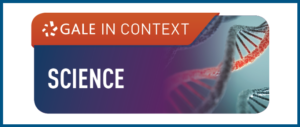 Science is an engaging online resource providing contextual information on hundreds of today’s most significant science topics. By integrating authoritative, curriculum-aligned reference content with headlines and videos, Gale In Context: Science draws researchers into the subject matter, showing how scientific disciplines relate to real-world issues, from weather patterns to obesity.
Science is an engaging online resource providing contextual information on hundreds of today’s most significant science topics. By integrating authoritative, curriculum-aligned reference content with headlines and videos, Gale In Context: Science draws researchers into the subject matter, showing how scientific disciplines relate to real-world issues, from weather patterns to obesity.
 This database is a definitive resource for students studying both the applied and general sciences. With coverage dating back to 1986, ProQuest Science Journals features over 1030 titles, with more than 760 available in full text. Search over 2.7M records, dating back to the mid 1980s.
This database is a definitive resource for students studying both the applied and general sciences. With coverage dating back to 1986, ProQuest Science Journals features over 1030 titles, with more than 760 available in full text. Search over 2.7M records, dating back to the mid 1980s.
